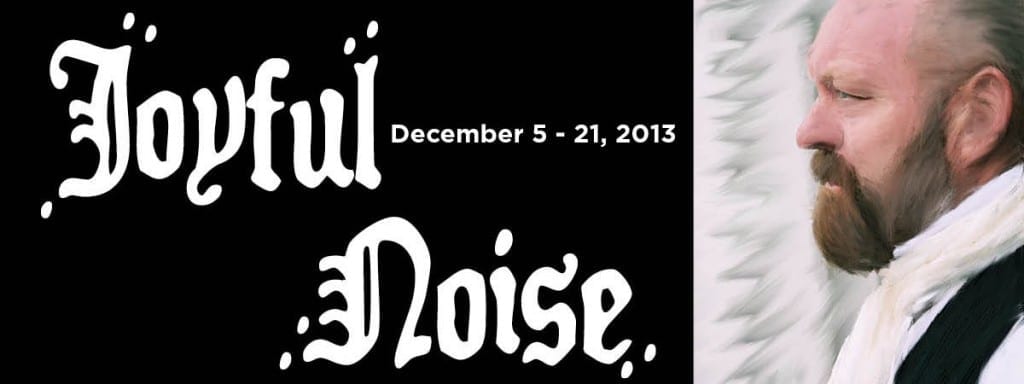PROVO — The year is 1741, and George Frederic Handel is in a slump. His recent operas have received a mixed or negative response from the London public. And the volatile mixture of Handel’s wounded artistic vanity and heavy drinking have made his recent failings seem like less of a slump and more of a forced retirement. Handel’s fortunes are en route to changing, though, when librettist Charles Jennens sends along a scriptural compilation for Handel to set to music.

Playwright Tim Slover’s Joyful Noise is a tale of redemption, following Handel (J. Scott Bronson) and a few close associates through the composition and London premiere of The Messiah. Aside from Handel himself, the play highlights the influences of King George II and contralto soloist Susanna Cibber on Handel’s creative process. Handel’s relationship with King George II (Travis Hyer) is also on shaky ground. While his wife Queen Caroline was a fervent supporter of the arts and of Handel in particular, the king now spends his days in a state of melancholy and ambivalence toward the arts in the wake of her recent passing. Susanna (Anna Daines Rennaker) has lately been made more famous by an infamous sexual scandal than by her theatrical pursuits. Unfortunately, it was harder for an actress of disreputable moral stature to find work in 18th century London than it might be today, and Cibber finds herself an outcast from polite society and a victim of widespread rumors.
Bronson played an endearing Handel whose awakening and transformation were both believable and compelling. Bronson’s Handel was a man in the midst of a somewhat blustery late-career crisi, who felt betrayed and abandoned by the public who had once admired him. I was most impressed at how easily Bronson’s integrity and humor made it for me to relate to the tempestuous and often self-centered Handel. Travis Hyer played a similarly raw and relatable King George II. Because he was sometimes used for comic relief, it would have been easy for an actor to play the king as a buffoon. Instead, I was impressed with how organically Hyer blended the king’s occasionally linguistic gaffes (being a native German) with his good intentions, political wisdom, and deep sense of loss for his wife.
In a more minor but nonetheless impressive role, Lynne D. Bronson played the delightful patron of the arts, Mary Pendarves. Here was another role whose scripting could easily have made her clownish, as she composed couplets in defense of Handel’s music and often spouted highfaluting language when faced with opposition. But rather than mugging for laughs, Bronson played the role with the kind of impassioned earnestness that Pendarves came off as easily likeable as well as unintentionally hilarious. As soprano and arch-rival to Susannah Cibber, Kitty Clive was an unlikely favorite. But Kat Webb played her with such a perfect Cockney accent and such competitive cattiness that Kitty Clive was easy to hate as a villain but enjoy as a character. I was always happy when Webb was on stage.
My only complaint for the play was that it seemed to drag. Rennaker played Susannah Cibber in a manner that kept me constantly aware of her tragic past, which may have been historically accurate, but often clashed with the less serious and action of the play. While her eagerness to reclaim her place on the stage and her relationship with her estranged daughter were compelling thematic elements, Rennaker’s penchant for tears made me sympathize with Kitty Clive. Handel’s business manager, John Christopher Smith (M. Cameron Bench), suffered from the exact opposite flaw. Bench seemed constantly aware that his character was on stage for comic relief. He often seemed to be mugging and trying to milk a joke, which had the unfortunate effect of making his character feel inhuman and and his jokes feel unnatural.
My feelings were mixed when it came to the roles of Bishop Henry Egerton (Patrick W. Kintz) and librettist Charles Jennens (Adam Argyle). They both had gripes with Handel that fit their roles. Egerton was opposed to using scripture for entertainment purposes or using it in conjunction with operatic instead of hymnal music. Jennens felt betrayed by the way Handel had reused some melodies and changed his vision for The Messiah. Both actors, though, were somehow both very hard to sympathize with or to hate. They just kind of existed and expressed themselves, even their very strongly-worded lines, in fairly humdrum manners. I could relate to their words but not necessarily their characters, which may have been the point. But I still would have liked for these characters to feel more human and less stilted.
While the musical performances occurred less frequently than one might expect from the subject matter, all of the vocalists were talented. Good accents don’t necessarily have the ability to make a play, but with individuals from several regions and classes, bad accents can easily ruin it. Luckily, each performer’s accent was executed perfectly. The only character whose accent confused me was Bishop Henry Egerton. I’m not sure where he was supposed to be from, but it’s hard to say whether that was more an effect of his subdued manner of speech than his accent.
Overall, the play was enjoyable if slow. The characters of Handel, Kitty Clive, Mary Pendarves, and King George II carried the play and offset the parts that dragged. Director David Hanson used some interesting staging devices which made the most of the small thrust stage with minimal set (by Dan James, Paul Duerden, Deann Morin, and Rowan James). Pam Davis’s costumes were gorgeous, and I would have gone just to see them. Particularly if you’re interested in the subject matter, this is a play worth seeing.
[gs-info-box]Joyful Noise plays in the Brinton Black Box at the Covey Center for the Arts (425 W. Center Street, Provo) Thursdays through Saturdays at 7:30 PM through December 21. Tickets are $12-$14. More information, visit www.coveycenter.org.[/gs-info-box]
